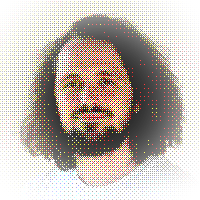 Dr. Théo Galy-Fajou
Dr. Théo Galy-FajouThéo Galy-Fajou is a doctor in Machine Learning specialized in Bayesian inference methods. He is particularly interested in approximate Bayesian inference methods like sampling, applications to Gaussian processes and online learning. Throughout his Ph.D., Théo developed numerous open source projects in Julia and dived deep into software development. He is currently working for PlantingSpace as a Julia software developer and Bayesian researcher.
You can find me on Github, Mastodon , ResearchGate and Twitter.
I finally defended my thesis on the 07th of July! I will upload the final version of the thesis soon.
I joined the PlantingSpace team in April as Julia software developer and Bayesian researcher!
A new paper got accepted at the Entropy journal! Check out "Flexible and Efficient Inference with Particles for the Variational Gaussian Approximation" with Valerio Perrone and Manfred Opper.
I gave a short poster presentation on my work on Turkie.jl for JuliaCon 2021, you can find the video here.
I gave a talk at the Cambridge Machine Learning Reading Group and it's been recorded, check it out on here on Youtube
Two papers were accepted for the AABI Symposium: Gaussian Density Parametrization Flow: Particle and Stochastic Approaches with Valerio Perrone and Manfred Opper and Evidence Estimation by Kullback-Leibler Integration for Flow-Based Methods with Nikolai Zaki and Manfred Opper.
JuliaCon 2020 is happening this week and here are the two talks I have given about my ongoing work on KernelFunctions.jl (presentation here) and AugmentedGaussianProcesses.jl (presentation here).
I started a new blog called "Bayesian Tribulations", it's very experimental at the moment but if you want have a look! I used Franklin.jl to generate it!
My paper "Adaptive Inducing Point Selection for Gaussian Processes" has been accepted for the Continual Learning Workshop of ICML 2020. You can check this introduction video for more info. Note that this is still a work in progress!
Our paper "Automated Augmented Conjugate Inference for Non-conjugate Gaussian Process Models" got accepted at the AISTATS 2020 conference, check it out! Here is a short explaining Twitter thread.
Our paper "Multi-Class Gaussian Process Classification Made Conjugate: Efficient Inference via Data Augmentation" got accepted for the UAI conference 2019, see you in Tel Aviv
Recently gave a short talk at Berlin Julia Meetup (join!), here are the slides and the notebook is here
Our paper "Efficient Gaussian Process Classification Using Polya-Gamma Data Augmentation" got accepted at the AAAI conference 2019!
We have a journal club to speak about Bayesian inference and Machine Learning papers. You can find more informations here
AugmentedGaussianProcesses.jl, package for working with Gaussian Processes and the augmentation developed in all the publications.
AugmentedGPLikelihoods.jl, package interfacing the work in AugmentedGaussianProcesses.jl and the JuliaGP ecosystem.
KernelFunctions.jl, kernel functions for machine learning in Julia.
AbstractGPs.jl, basic implementation for Gaussian Processes in Julia with an emphasis on probabilistic programming.
Turkie.jl, live visualization of sampling statistics with Turing.jl and Makie.jl.
BayesianQuadrature.jl, different Bayesian quadrature methods.
ThermodynamicIntegration.jl, thermodynamic integration with support for Turing models.
2022 : PhD in Machine Learning under the supervision of Professor Manfred Opper (pdf to be uploaded soon) Technische Universität Berlin, Berlin, Germany.
2015 : MsC of Physics EPFL (École Polytechnique Fédérale de Lausanne) master thesis (pdf here) at University of Edinburgh/CERN with Minor in Computational Science and Engineering.
2012 : BsC of Physics EPFL (École Polytechnique Fédérale de Lausanne), Lausanne, Switzerland
2009 : Baccalauréat Lycée Vincent Auriol, Revel, France
2017-2022: Research Assistant @ Technische Universität Berlin
2016-2017 : Research intern @ Humboldt-Universität zu Berlin
2015-2016 : C++ Software developper in MRI development @ Siemens Healthcare in Lausanne
2012-2015 : Teaching assistant for Particle Physics, General Physics @ University of Edinburgh & EPFL
2015 : Internship in Particle Physics @ Lancaster University
You can find a more complete CV here